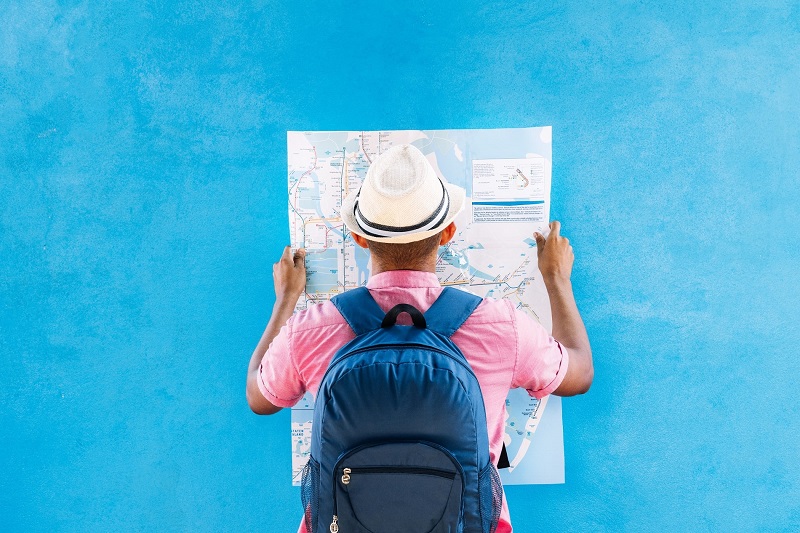Traveling can be a wonderful experience, but it can also be stressful and overwhelming. The Traveler’s Mindset is an approach to travel that involves keeping calm and positive throughout the journey. This mindset can help travelers enjoy their trip more and avoid unnecessary stress.

One of the key aspects of The Traveler’s Mindset is being prepared. This means doing research ahead of time, packing appropriately, and having a plan for the trip. By being prepared, travelers can feel more in control and less anxious. It also allows them to be more flexible and adaptable if unexpected situations arise.
Understanding the Traveler’s Mindset

Traveling can be a thrilling and life-changing experience, but it can also be stressful and overwhelming. To make the most of your journey, it’s essential to adopt a traveler’s mindset. This mindset involves embracing flexibility, maintaining openness, and cultivating mindfulness.
Embracing Flexibility
One of the most critical elements of the traveler’s mindset is flexibility. Traveling often involves unexpected changes, delays, and challenges. To navigate these obstacles successfully, it’s essential to be adaptable and open to new experiences. This means being willing to change your plans, try new things, and go with the flow.
Maintaining Openness
Another key aspect of the traveler’s mindset is openness. When traveling, you’ll encounter people, cultures, and ideas that may be different from your own. To make the most of your journey, it’s important to approach these differences with an open mind and a willingness to learn. This means being curious, asking questions, and being respectful of the people and cultures you encounter.
Cultivating Mindfulness
Finally, the traveler’s mindset involves cultivating mindfulness. Traveling can be hectic and overwhelming, and it’s easy to get caught up in the chaos. To stay calm and centered, it’s important to practice mindfulness techniques such as meditation, deep breathing, and yoga. These practices can help you stay present, focused, and grounded throughout your journey.
By embracing flexibility, maintaining openness, and cultivating mindfulness, you can develop a traveler’s mindset that will help you make the most of your journey. With this mindset, you’ll be able to navigate the challenges of travel with confidence and grace, and make meaningful connections with the people and places you encounter along the way.
Preparation Strategies

Planning Your Itinerary
Having a solid itinerary is key to a successful trip. Before embarking on any journey, it’s important to research your destination and make a list of the must-see attractions and experiences. This will help you prioritize your time and ensure that you don’t miss out on anything important.
Consider using a travel app or website to help you plan your itinerary. These tools can help you find the best deals on flights, hotels, and activities, and can also provide recommendations based on your interests and budget.
Anticipating Challenges
No matter how well you plan, unexpected challenges can still arise during your travels. It’s important to anticipate these challenges and have a plan in place for how to handle them.
For example, if you’re traveling to a foreign country, it’s a good idea to research the local customs and laws to avoid any cultural misunderstandings. You should also be prepared for any language barriers by learning some basic phrases in the local language.
Packing Essentials
Packing can be a daunting task, but it’s important to pack smart and bring only the essentials. Make a list of the items you’ll need for your trip, and then go through it to eliminate anything that’s not absolutely necessary.
Some essential items to pack include comfortable walking shoes, a versatile jacket or coat, a travel-sized first aid kit, and any necessary medications. Don’t forget to also pack a travel adapter if you’re traveling to a country with different electrical outlets.
By following these preparation strategies, travelers can set themselves up for a stress-free and enjoyable journey.
Stress Management Techniques

Stress is an inevitable part of traveling, but it doesn’t have to ruin your trip. There are several stress management techniques that can help you stay calm and positive on your journey.
Deep Breathing Exercises
One of the simplest and most effective stress management techniques is deep breathing. This technique involves taking slow, deep breaths and letting them out slowly. It can help you relax and calm your mind when you’re feeling anxious or stressed.
To practice deep breathing, find a quiet place to sit or lie down. Close your eyes and take a deep breath in through your nose, counting to four. Hold your breath for a count of four, then slowly exhale through your mouth for a count of four. Repeat this process for several minutes until you feel more relaxed.
Engaging in Physical Activity
Engaging in physical activity is another great way to manage stress while traveling. Exercise releases endorphins, which can help improve your mood and reduce stress levels.
You don’t need to hit the gym to get some exercise while traveling. Simple activities like walking, hiking, or swimming can be great ways to stay active and reduce stress. Even just taking the stairs instead of the elevator can make a difference.
Practicing Meditation
Meditation is a powerful stress management technique that can help you stay calm and centered while traveling. It involves focusing your mind on a specific object, word, or phrase to help you relax and reduce stress.
To practice meditation, find a quiet place to sit or lie down. Close your eyes and focus on your breath, repeating a calming word or phrase to yourself. Try to clear your mind of any distracting thoughts and focus on your breath and your chosen word or phrase.
By practicing these stress management techniques, you can keep a positive and calm mindset while traveling. Remember to take care of yourself and prioritize your mental health during your journey.
Staying Positive in the Face of Adversity
When traveling, it’s not uncommon to encounter unexpected challenges that can put a damper on your trip. Whether it’s a missed flight, lost luggage, or a language barrier, these obstacles can quickly turn a once-exciting adventure into a frustrating experience. However, with the right mindset and approach, it’s possible to stay positive and make the most out of any situation.
Adopting a Solution-Oriented Approach
One of the keys to staying positive when faced with adversity is to adopt a solution-oriented approach. Instead of dwelling on the problem, focus on finding a solution. For example, if you miss a flight, instead of becoming upset, look for alternative options, such as booking a new flight or taking a train.
Seeking Support from Fellow Travelers
When facing challenges, it can be helpful to seek support from fellow travelers. They may have experienced similar situations and can offer advice or even lend a helping hand. Strike up a conversation with someone in your hostel or on a tour and you may find that you have more in common than you thought.
Reflecting on Positive Experiences
Finally, it’s important to reflect on positive experiences to help maintain a positive mindset. Take some time to think about the amazing sights you’ve seen, the delicious food you’ve tasted, and the interesting people you’ve met. By focusing on the good, you can help shift your perspective and overcome any challenges that come your way.
Overall, by adopting a solution-oriented approach, seeking support from fellow travelers, and reflecting on positive experiences, it’s possible to stay positive and make the most out of any situation while traveling.
Cultural Sensitivity and Adaptation
Learning Local Customs
When traveling to a new place, it is important to learn about the local customs and traditions. This includes understanding the social norms, dress codes, and etiquette. For example, in some cultures, it is customary to remove shoes before entering a home, while in others, it is considered impolite to show the soles of your feet.
To learn about local customs, travelers can consult guidebooks, ask locals, or do research online. It is important to approach learning about local customs with an open mind and a willingness to adapt. By showing respect for local customs, travelers can avoid offending locals and build positive relationships.
Communicating with Respect
Communication is key when traveling to a new place. It is important to be aware of cultural differences in communication styles and to communicate with respect. This includes using appropriate language and tone, avoiding sensitive topics, and being aware of nonverbal cues.
To communicate effectively, travelers can learn basic phrases in the local language, use a translation app, or hire a local guide. It is important to approach communication with an open mind and a willingness to learn. By showing respect for the local language and culture, travelers can build positive relationships and enhance their travel experience.
Embracing Local Experiences
One of the best ways to experience a new culture is to embrace local experiences. This includes trying local food, attending cultural events, and engaging with locals. By embracing local experiences, travelers can gain a deeper understanding of the local culture and build positive relationships with locals.
To embrace local experiences, travelers can consult guidebooks, ask locals for recommendations, or do research online. It is important to approach local experiences with an open mind and a willingness to try new things. By embracing local experiences, travelers can enhance their travel experience and create lasting memories.
Health and Safety Considerations
When traveling, it is essential to keep your health and safety in mind. Being away from home can expose you to new environments, different climates, and unfamiliar foods, which can all impact your well-being. Here are some tips to stay healthy and safe while on the road.
Staying Hydrated and Nourished
Maintaining proper hydration and nutrition is crucial when traveling. It is easy to forget to drink enough water or eat healthy foods when you are busy exploring new places. However, dehydration and malnutrition can lead to fatigue, headaches, and other health issues, which can ruin your trip.
To stay hydrated, bring a reusable water bottle with you and refill it throughout the day. You can also drink coconut water, sports drinks, or other electrolyte-rich beverages to replenish your body’s fluids. Eating fresh fruits and vegetables, lean protein, and whole grains can provide you with the necessary nutrients to stay energized and healthy.
Prioritizing Rest
Traveling can be exhausting, and it is essential to prioritize rest to avoid burnout. Lack of sleep can weaken your immune system, impair your judgment, and make you more susceptible to accidents and illnesses.
Make sure to get enough sleep each night, even if it means sacrificing some sightseeing or nightlife. You can also take short naps during the day to recharge your batteries. Additionally, avoid overloading your itinerary with too many activities, and take breaks when you need them.
Being Aware of Surroundings
When traveling to unfamiliar places, it is crucial to be aware of your surroundings. Pay attention to your surroundings, and be cautious when walking in unfamiliar areas, especially at night. Avoid carrying too much cash or valuables with you and keep your belongings secure at all times.
Moreover, be mindful of local customs, laws, and cultural norms, and respect them. If you are unsure about something, ask locals or your travel guide for advice.
By following these health and safety considerations, you can enjoy your travels with peace of mind and make the most of your journey.
Conclusion
In conclusion, adopting a positive and calm mindset while traveling can greatly enhance the overall experience. It allows the traveler to fully immerse themselves in the culture and surroundings, without being bogged down by stress and negativity.
One effective way to maintain a positive mindset is by practicing mindfulness. This involves being present in the moment and focusing on one’s surroundings, rather than worrying about future events or past mistakes. Mindfulness can be achieved through meditation, deep breathing, or simply taking a moment to appreciate the beauty around you.
Another key aspect of the traveler’s mindset is flexibility. Travel plans can often change unexpectedly, and being able to adapt to these changes can prevent frustration and disappointment. This may involve being open to trying new activities or visiting different destinations than originally planned.
Finally, it is important to stay organized and prepared while traveling. This can include packing efficiently, keeping important documents in a safe place, and having a backup plan in case of emergencies. By taking these steps, travelers can reduce stress and focus on enjoying their journey.
Overall, by adopting a positive and flexible mindset, and staying organized and prepared, travelers can make the most of their journey and create unforgettable memories.










0 Comments